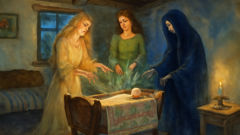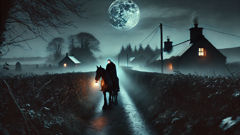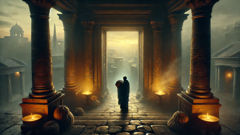Introduction
In the shadow of the Carpathian Mountains, where misty forests cradle villages like secrets whispered from ancient lips, the people of Romania have always believed in the threads that bind life. Every cobbled path and mossy stone seemed touched by stories too old to be written, yet too powerful to be forgotten. Among the most cherished tales whispered by firelight is the legend of the Ursitoare—the Fates—three fairy-like beings who arrive unseen to each cradle, weaving destinies with hands as gentle as the breeze and as unyielding as time. On a night when the moon was veiled and the stars burned bright with silent promises, the villagers of Borna prepared to welcome a new soul. They sang lullabies that trembled with hope, and hung sprigs of basil and mugwort by the door to ward off shadows. Yet, beneath every celebration, there pulsed a quiet awe, for each child’s future was said to be spun, measured, and cut by the Ursitoare. No one saw them arrive. They stepped from the hush between heartbeats, cloaked in shimmering veils of mist and moonlight, moving through the world like dreams. Some say their footsteps leave dew on the grass and their voices echo in the rustle of leaves. Their craft was not of this world, and neither joy nor grief could sway their judgment—except, perhaps, the secret wish of a mother brave enough to beg for her child’s happiness. This is the story of such a mother, her newborn son, and the mysterious Ursitoare, whose visit would change not only one life, but the very spirit of a village. It is a legend stitched with wonder, choice, and the wild hope that even fate may bend to the power of love.
I. The Night of Arrival
The village of Borna slumbered beneath a shroud of silence, broken only by the wind’s sigh through pine branches and the distant howl of a wolf. In a modest house at the village’s edge, Ana cradled her newborn son, her heart thundering with love and fear in equal measure. She watched his chest rise and fall, counted his tiny fingers and toes, and wondered what the world would bring him.
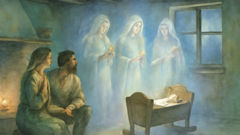
Beyond the walls, villagers gathered. Custom demanded it: on the third night after a child’s birth, family and neighbors kept vigil to invite the Ursitoare. They left gifts of honey bread and sweet wine on the windowsill and whispered prayers into the darkness. It was said that the Ursitoare passed over every child, but only revealed themselves to those whose destinies were bright, troubled, or marked for greatness.
Ana’s husband, Gheorghe, knelt by the hearth, his face drawn with exhaustion and hope. He’d built the cradle with his own hands, carving tiny stars into its frame. The warmth of the fire, mingled with the scent of basil, cast strange shadows on the walls. Ana listened to the lullabies outside and wondered if any other mother had ever felt so helpless. She traced a finger over her son’s brow and whispered his name: Ionu?.
Midnight approached. The guests’ voices faded, one by one. The house grew colder. Ana clutched her son closer. She thought of her own childhood—stories of the Ursitoare told by her grandmother as they shelled beans by lamplight. She remembered tales of children marked for greatness, or for sorrow, and mothers who had tried, sometimes in vain, to change what was written.
As the last candle guttered low, a hush fell over the world. The air seemed to thicken, and the room filled with a silver mist that glowed from within. Ana blinked, thinking herself dreaming. But when she opened her eyes, she saw them: three figures, neither young nor old, neither human nor spirit. Their dresses shimmered like river water, their hair flowed like black silk streaked with starlight. Each carried a spindle—one golden, one of pale ash wood, one dark as obsidian.
The eldest, whose eyes held the dawn, stepped forward. She smiled at Ana, a smile both kind and terribly distant. “We are the Ursitoare,” she said, her voice the sound of wind in the reeds. “We have come to spin, measure, and cut the thread of your child’s fate.”
Ana’s breath caught. She wanted to speak, to beg, but awe held her tongue. Gheorghe fell to his knees beside her. Ionu? slept on, his tiny fists curled.
The second Ursitoare approached. Her touch was gentle as she lifted the baby’s hand and tied a gossamer thread around his wrist. “His fate is bright,” she whispered, “but not untroubled. He will face shadows as well as sunlight.”
The third Ursitoare, whose presence felt like midnight itself, raised her scissors. Ana’s heart thudded. She found her voice at last. “Please,” she begged, “give him joy. Spare him sorrow. Let him know love.”
The three beings exchanged a glance, as if weighing the plea on unseen scales. The eldest replied, “Fate is a tapestry. We can weave, but even we do not always choose the pattern.” Yet her eyes softened. “Sometimes, a mother’s hope may become a thread.”
With that, the Ursitoare began their ancient work. The golden spindle spun threads of possibility, gleaming with promise. The pale spindle measured them, careful and wise. The dark spindle hovered, ready to cut—but always pausing, listening for Ana’s whispered prayers. Outside, the village night stretched on, but within those walls, the world hung suspended between what was and what might be.
II. Threads of Hope and Sorrow
As the Ursitoare worked, Ana felt the air change, charged with something older than memory. The golden thread grew longer and longer, spun from the first Ursitoare’s spindle. It shimmered with images: a child’s laughter under apple trees, a young man’s strong hands at the plow, the embrace of friends by a crackling fire. The promise of life—ripe, full of warmth.
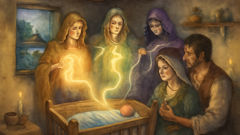
Yet, as the second Ursitoare measured, her pale spindle revealed moments shadowed by grief: storms flattening crops, betrayal from a trusted friend, loneliness that clung like fog. Ana flinched as these visions flickered by, wanting to close her eyes. But she forced herself to watch, to accept the fullness of what might come.
The third Ursitoare hovered, her dark scissors poised. Ana could not tell if she was friend or foe, mercy or doom. Yet in her gaze Ana saw not malice, but inevitability—a reminder that every story must end, even as others begin.
Time seemed to bend in that small room. Ionu? slept, his dreams untroubled, while his fate was crafted from all that life could offer. Gheorghe wept quietly, overwhelmed by love and fear for his son.
Suddenly, the first Ursitoare paused. She looked at Ana and smiled, her eyes twinkling with mischief. “Every thread is changed by the love that surrounds it,” she said. “Your hope is strong, Ana. It weaves itself into his destiny.”
Ana reached out, daring to touch the golden thread. Her fingers tingled as warmth surged into the tapestry. Images shifted—where before there had been storm, now appeared shelter; where there had been betrayal, now flickered forgiveness; loneliness softened into resilience.
The second Ursitoare nodded. “He will know struggle, but he will also know the strength to rise again.”
The third Ursitoare’s scissors hesitated above the thread. “And when his time comes, he will not walk alone.”
The mist swirled, and for a moment, Ana saw visions not only of her son’s life but of countless others—threads crossing, weaving together into a vast and intricate pattern. She glimpsed generations yet unborn, villages thriving and falling, laughter and tears echoing through time.
The Ursitoare began to sing, their voices weaving a melody that seemed to vibrate in the bones. It was the song of fate—sorrow and joy entwined. Ana’s fear faded, replaced by acceptance and a quiet strength. She pressed a kiss to Ionu?’s brow and whispered her own wish: “May you be brave, may you be wise, may you always choose kindness.”
The Ursitoare finished their work. The first tied off the golden thread with a flourish; the second tucked it beneath the baby’s pillow; the third lowered her scissors, but did not cut. Instead, she smiled—a rare gift. “His story is not yet finished.”
The silver mist receded. The Ursitoare faded into moonlight, their song lingering in the rafters like a blessing. Ana and Gheorghe held each other and their son, hearts full not with fear, but with hope.
III. The Choice and the Change
The villagers returned to their homes with dawn, unaware of what had transpired behind Ana’s door. Only an elder woman named Baba Ileana, old enough to remember miracles and misfortune alike, sensed something had changed. She brought a loaf of warm bread and lingered at Ana’s window, her sharp eyes glinting.
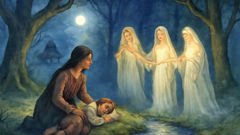
Ana welcomed her inside and shared what she’d seen. Baba Ileana listened without surprise. “The Ursitoare visit every cradle,” she said, “but only a few ever notice their touch.”
As Ionu? grew, his childhood unfolded like the tapestry woven on that sacred night. He was quick to laugh and kind to all—yet trouble did find him. When storms battered the village and crops withered, he comforted friends with quiet courage. When betrayed by a companion, he forgave and rebuilt trust. Each sorrow was matched by a lesson learned, and each joy was cherished all the more because of it.
But there came a day when the village faced peril greater than any in living memory. Marauders swept down from the north, burning fields and scattering families. Gheorghe fell defending his home. Ana, clutching Ionu?—now a boy of twelve—fled to the ancient forest that skirted Borna. For three days and nights, they hid among twisted oaks and mossy stones, surviving on roots and faith.
On the fourth night, Ana sat by a stream, exhausted and afraid. Ionu? slept fitfully beside her. The forest was full of sounds—branches creaking, owls calling—but in the hush between breaths, Ana heard the faintest melody. The song of the Ursitoare.
She looked up to see three faint figures drifting between the trees. This time, she did not fear them. “Why have you come?” she whispered.
The first Ursitoare answered, “Every destiny has crossroads.”
The second added, “Every thread may change direction.”
The third’s eyes were dark and kind. “Choice is the gift we leave behind.”
Ana knelt before them. “Will my son survive?”
The Ursitoare did not answer directly. Instead, they held out the golden thread that had once been spun for Ionu?. It glowed faintly in their hands.
“You may choose,” said the eldest. “Hide and let fate unfold. Or risk all—your life for his chance to save others.”
Ana understood. She remembered her grandmother’s words: Fate is strong, but love is stronger still.
At dawn, Ana led Ionu? out of hiding and returned to Borna. The marauders remained, but Ana stood before them with courage she did not know she possessed. She pleaded for mercy, offered herself as a servant if they would spare the village children. Her bravery caught the attention of the bandits’ leader, a man weary of cruelty. He saw in Ana a strength that reminded him of his own mother. Moved by her sacrifice, he ordered his men to leave Borna in peace.
The villagers returned and rebuilt together. Ana’s act of courage became legend. Ionu? grew to be wise and generous, respected by all. The golden thread of fate, once spun by the Ursitoare, had been strengthened by love—and bent by choice.
Conclusion
Years later, when Ionu? became a father, he told his own children the story of the Ursitoare—their shimmering veils, their spindles, their silent wisdom. He spoke not only of destiny but of the choices that shape every life, the way love can thread itself through sorrow to create beauty out of hardship. The legend became part of the village’s soul. It was told in song, embroidered in cloth, and whispered in the hush before dawn. Parents learned to hope fiercely for their children but also to teach them courage and kindness, knowing that fate and free will are woven together in every heartbeat. Some say the Ursitoare still wander the hills and forests of Romania, their song drifting on the night wind. Others believe they live within every act of love or sacrifice, every decision made in hope or fear. The villagers of Borna never forgot that destiny is not fixed but alive—a tapestry woven not only by unseen hands but by every choice we dare to make.

